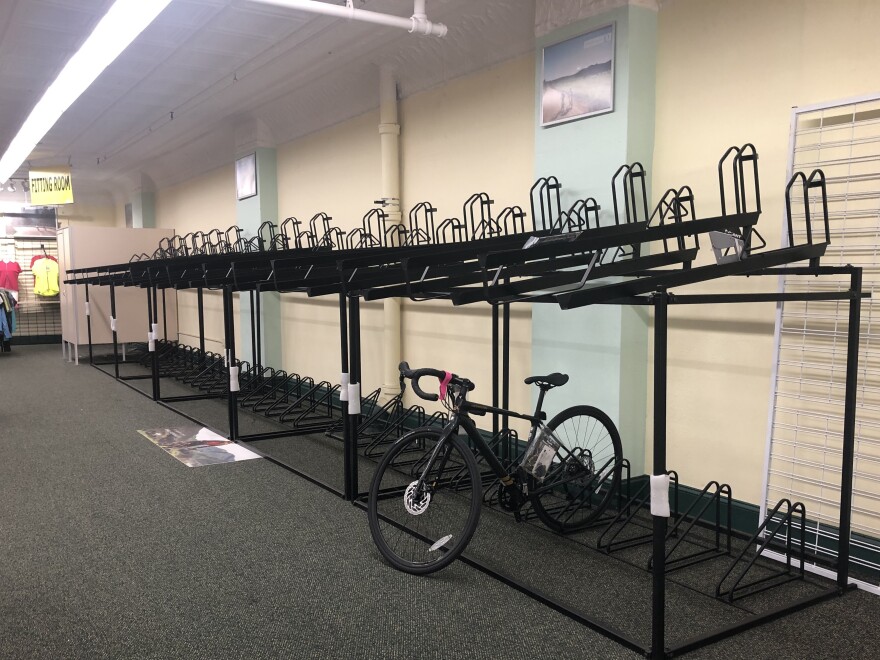The thought of packing herself onto a crowded bus or train makes Magali Olson cringe.
"I'm afraid to really take the train," Olson says. "I mean, I don't know if people are being clean or not, you know?"
She is able to work from home some days, but she's had to ride Chicago's Blue Line trains two days a week to her job at an insurance company downtown.
"Although I had Clorox wipes to clean everything, before I sat or touch anything, I was still a little scared," she says. "Some people weren't wearing masks, so it's a little scary."
Like other transit systems, the Chicago Transit Authority requires riders to wear masks and frequently and thoroughly cleans trains and buses. But like many Americans during this pandemic, Olson is still uncomfortable riding public transit, so she went out and bought herself an electric scooter.

"It's really, really easy" to both ride and charge up in her garage on Chicago's northwest side, Olson says. "It doesn't go more than 30 miles per hour so I can just take it down[town] ... and call it a day. I'm actually looking forward to going to the office."
Scooters are just one of the transportation modes increasing in popularity among commuters during the pandemic, which is changing how many of people get around. Another of the two wheeled variety is the good old bicycle. But if you don't already have one, it's going to be difficult to find one.
Over at Kozy's Cyclery, the phones are almost constantly ringing, but anyone looking to buy a bike is probably out of luck. This huge shop, with three levels of retail space, is almost empty.

"Everything in a 2020 model in a bike has basically left the building," says Sherdon Weir, a manager at one of the three family-owned Kozy's Cyclery shops in Chicago. "We're left with high-end road bikes and high-end electric bikes ... and we're down to the smallest kids' bikes."
"2021 models are trickling in," Weir says, with just one or two sometimes arriving in a shipment. He says they're put together the night they arrive and go out the next day to customers who have been waiting for them. "We have a box filled with customers' [orders] that have had bikes on hold since March."
Weir says electric bikes, which give a person's pedaling a power boost, are especially popular among commuters.
"Because most people don't want to be sweaty when they get into work," he says. "It is a game-changer. Sales have basically tripled for electric bikes."
But while the sales side of the shop is empty of bikes, the service side is overflowing with them. Weir says at times, 15 to 20 people will be lined up out in front of the shop (social distancing limits the number of customers allowed inside at a time) to get their older bikes fixed up and repaired.
"Since they can't get a bike, they've dug up bikes from their basement that need either tires and tubes, that need tuneups."
It's the same story at bicycle shops all across the country, and while some of the demand is coming from those who want bikes to commute, much of it is from recreational users who see it as way to enjoy the outdoors with their families, or spend time with friends in a safe and socially distant way.
"Biking is really on fire right now," says Audrey Wennink, director of transportation for the Metropolitan Planning Council in Chicago, a regional nonprofit focused on urban planning.
She says many cities are expanding bike-share programs, like Chicago's Divvy bikes, to accommodate the increased demand. There are also more shared scooter programs, and some cities are working to accommodate the pandemic-related increase in walking, with new trails, sidewalk improvements and safety enhancements.
But as scores of bicyclists, skateboarders and rollerbladers whiz by her on Chicago's busy Lakefront Trail, she points to the hundreds of cars jamming up on the eight-lane highway next to it, Lake Shore Drive.
"We are seeing traffic levels, in terms of cars, having gone up to almost pre-COVID levels."
Even though many people are out of work or still working from home, many cities are seeing significant increases in motor vehicle traffic this summer.
In Chicago and in other cities with robust transit systems, people who have never owned cars before are suddenly buying them. In New York City, some are calling it "carmaggedon," as residents there registered 40,000 new cars in July, the highest monthly total in years. Meanwhile, NYC subway ridership is still down more than 75% from last year.
Across the country, used car sales in particular are up, while people still largely avoid car-sharing and ride-hailing companies like Uber and Lyft. Their business remains down significantly.
At the same time, many cities are at least temporarily closing off many streets to cars, turning them into bike lanes and shared spaces for pedestrians, outdoor dining and even play lots.
"This is a real turning point," says Wennink, "and we can go one of two ways."
"One, where we see a huge uptick in car usage and car ownership and congestion," Wennink says. Alternatively, cities can support more active and sustainable transportation options, like walking and biking.
"Because the long term problems that we have of climate change, of congestion, of constrained spaces in urban areas, those are still conditions that will continue to exist."
She and other transportation and urban planning experts say there's an opportunity in the COVID-19 crisis: to rethink how people get will around and use urban spaces differently in a post-pandemic world.
Copyright 2021 NPR. To see more, visit https://www.npr.org.



